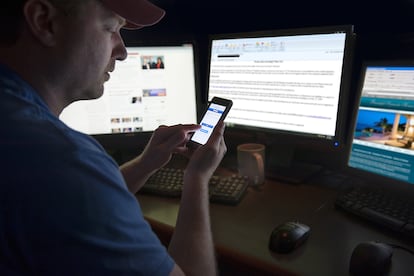Disconnecting from social media reduces life satisfaction, according to study
New research has cast doubt on the benefits of digital detoxes, finding that both positive and negative affect fell after a week of abstinence


Social media is a double-edged sword. It can help us to connect to others, feel closer to people who are far away, and even to make friends with people from different countries. But it can also be addictive, lead to enormous social pressure and be a springboard for eating disorders. Given social media’s role in today’s society, it’s common for people — particularly celebrities — to announce when they have decided to disconnect. Singer and actress Selena Gómez, for example, recently announced that she was taking a break from social networks. But the impacts of having a digital detox may not be as positive as first thought, according to a study from the University of Durham (England), which was published on Wednesday in the journal PLoS.
The researchers found that, after a week of abstaining from social media, the study participants reported lower levels of negative affect and boredom, but also a reduction of positive affect and life satisfaction. Social networks provide powerful social rewards, so abstaining from them “may lead to some reduction in positive emotions,” explains Niklas Ihssen, one of the authors. The opposite is also true: negative feelings may be reduced as a person is exposed to less intimidation, harassment and content that could trigger social comparisons or FOMO.
For the study, the researchers used a sample of 51 students from Durham University between 18 and 25 years old, who had to stop using social networks for a week. Their mood was assessed three days before starting and four days after the abstinence period ended. During the days when they were abstaining from social media, they also had to fill out four daily questionnaires with questions about boredom, loneliness, social media cravings, and positive and negative emotions. Before the end of that week, 86% had relapsed at least once and gone on social media.
After the study period, the authors concluded that there was no evidence that disconnecting from social networks produces withdrawal symptoms. But for Marian García, director of Orbium, a Therapeutic Center specialized in addictions, more rigorous research is still needed. The psychologist points out that the people in the sample did not have addiction problems and, even if they did, “a week is a very short time” to assess possible withdrawal. “An addict’s mood does not get worse as soon as they stop using,” she explains. Furthermore, knowing from the outset that the abstinence period would be over after a certain period may have influenced the behavior of the study participants.
Remedios Zafra, a researcher at the Institute of Philosophy (IFS) at Spain’s national research institute CSIC, believes that the findings could be valuable when it comes to disconnection strategies. Before abstaining, the study participants used social networks for an average of between three and four hours a day. After that week, they reduced that time to half an hour. “They were able to significantly reduce their use without experiencing any adverse negative effects,” says Ihssen.
García says that one week of abstaining from social media is not enough to reach conclusions about how it affects users, arguing that the minimum period should be three months. The psychologist also believes that a longer follow-up would be needed to ensure that the findings remain the same. She says that social media users are generally able to reduce the habit, but pick it up again over time.
In the study, the researchers also looked at how the participants spent their time when they were abstaining from social media. The two most common pastimes were video games and online shopping. For García, this is clear “substitution” behavior. He explains that users could get the same dopamine hit from these activities as from social media.
Indeed, Meta, the owner of Instagram and Facebook, is facing a class action lawsuit in the United States; it is accused of knowingly promoting the addictive and compulsive use of social networks among children and adolescents. “The addictive potential of current technologies is enormous and, therefore, the issue of disconnection is of vital importance for people,” says Zafra.
Ihssen says that the arrival of any new technology triggers concern about its impact on people’s well-being, warning that certain behaviors should not be overpathologized. Covadonga González-Nuevo, professor of Psychology at the University of Burgos in Spain, says that, although social networks are associated with problems such as anxiety, depression and body dissatisfaction, abusive use does not have to be associated with poor mental health. “On social networks, all types of uses coexist, and it is advisable to minimize the negative ones.”
Ihssen insists that the results of the research indicate that social networks “should not be considered addictive in the sense of causing withdrawal and cravings.” The researcher says social media can provide both positive and negative experiences and that it must be used responsibly. In other words, it is up to the social media user.
Sign up for our weekly newsletter to get more English-language news coverage from EL PAÍS USA Edition
Tu suscripción se está usando en otro dispositivo
¿Quieres añadir otro usuario a tu suscripción?
Si continúas leyendo en este dispositivo, no se podrá leer en el otro.
FlechaTu suscripción se está usando en otro dispositivo y solo puedes acceder a EL PAÍS desde un dispositivo a la vez.
Si quieres compartir tu cuenta, cambia tu suscripción a la modalidad Premium, así podrás añadir otro usuario. Cada uno accederá con su propia cuenta de email, lo que os permitirá personalizar vuestra experiencia en EL PAÍS.
¿Tienes una suscripción de empresa? Accede aquí para contratar más cuentas.
En el caso de no saber quién está usando tu cuenta, te recomendamos cambiar tu contraseña aquí.
Si decides continuar compartiendo tu cuenta, este mensaje se mostrará en tu dispositivo y en el de la otra persona que está usando tu cuenta de forma indefinida, afectando a tu experiencia de lectura. Puedes consultar aquí los términos y condiciones de la suscripción digital.








































